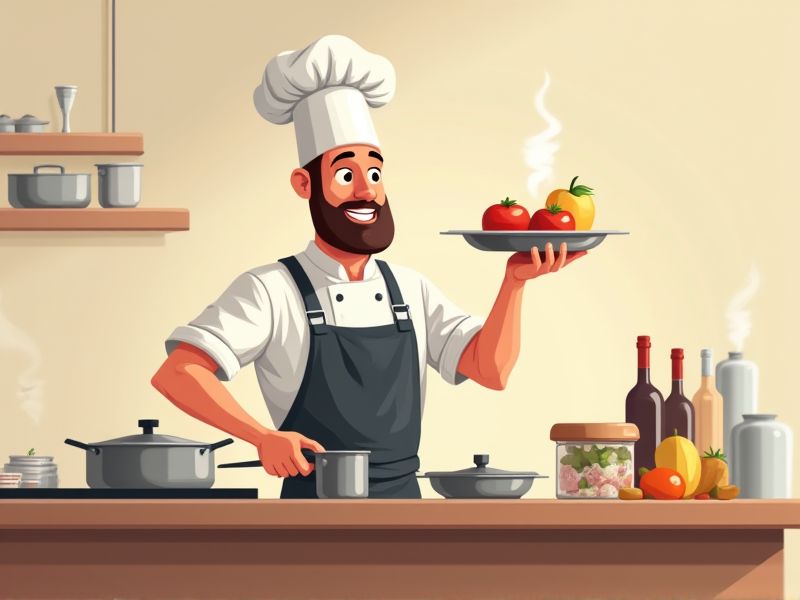
To improve at cooking, it's essential to understand that practice is key, as Julia Child once said, "No one is born a great cook, one learns by doing" . This emphasizes the importance of hands-on experience and experimentation in the kitchen. Thomas Keller also highlights the value of understanding the foundations of cooking, noting that once you grasp these basics, you can cook without relying on cookbooks . By embracing this approach, cooks can develop their skills and creativity, allowing them to innovate and adapt recipes to their own style.
How to Be Better at Cooking
Practice consistently.
Regular, consistent practice is essential because it reinforces muscle memory for critical techniques and builds foundational skills. Trying new recipes routinely increases exposure to diverse flavors and methods, which creates a direct link between effort and culinary improvement. Repeatedly applying lessons learned from past mistakes sharpens intuition, leading to quicker adaptations in the kitchen. Consistency in cooking practice ultimately results in enhanced efficiency, creative confidence, and a tangible improvement in meal quality.
Master knife skills.
Mastering knife skills is essential for elevating overall cooking abilities. Developing precise cuts shortens preparation time and improves ingredient consistency, leading to more evenly cooked dishes. Consistently practicing proper grip and technique minimizes the risk of injury, which boosts both confidence and efficiency in the kitchen. Enhanced knife skills also serve as the foundation for experimenting with advanced culinary techniques, ultimately transforming everyday cooking into an art form.
Understand flavor profiles.
Understanding flavor profiles is essential because they reveal how ingredients interact to create balanced and nuanced dishes. Analyzing each element--sweet, salty, sour, bitter, and umami--provides insight into how to adjust and harmonize your ingredients. By experimenting with different spice combinations and cooking techniques, you develop the intuition needed to refine your recipes. Consistently applying data-supported approaches from culinary science enhances your overall skillset and confidence in the kitchen.
Embrace mise en place.
Embracing mise en place--which means having all your ingredients prepped and organized before cooking--boosts efficiency and minimizes last-minute errors. This method reduces stress in the kitchen because each component is readily accessible, allowing you to focus on technique. Studies in culinary performance indicate that chefs who practice mise en place consistently achieve more reliable and high-quality dishes. An organized prep routine cultivates an adaptable cooking mindset, leading to better results and more creative culinary endeavors.
Perfect heat control.
Mastering heat control leads to predictable cooking outcomes and elevates flavor profiles consistently. Precise temperature regulation ensures that ingredients reach optimal doneness without losing nutrients or texture. Adjusting the heat at various stages of cooking minimizes the risk of burning while promoting even cooking throughout the dish. Consistent practice in fine-tuning your stove or oven settings translates directly to improved culinary results over time.
Experiment boldly.
Experiment boldly by incorporating new ingredients and techniques into your recipes, which immediately sparks creativity and enhances your understanding of flavor combinations. Stepping outside your comfort zone directly cultivates skill improvements, as each trial uncovers what uniquely works best for your cooking style. By systematically testing different methods, you gather actionable data that refines your culinary techniques over time. This iterative process demonstrates that taking calculated risks in the kitchen produces measurable, effective improvements in your overall cooking proficiency.
Refine fundamental techniques.
Accurately refining fundamental techniques leads to noticeable improvements in every dish you create. Mastering basic skills such as knife handling, seasoning, and temperature control allows for smoother execution in more complex recipes. As you build a stronger foundation, your confidence and creativity expand, transforming everyday cooking into an art. Prioritizing data-driven practice and consistent repetition in these basics creates a direct path to enhanced culinary performance.
Prioritize fresh ingredients.
Fresh ingredients enhance the natural flavors of any dish, providing a vibrant base for your culinary creations. Local, seasonal produce not only delivers better taste but also offers superior nutritional benefits compared to processed alternatives. By sourcing fresh items, you reduce the need for artificial additives, resulting in meals that are both healthier and more authentic. Reliable data and expert culinary insights consistently show that prioritizing fresh ingredients is a crucial step toward mastering the art of cooking.
Seek constructive feedback.
Being receptive to constructive feedback from peers and professionals paves the way for measurable skill improvements in the kitchen. Detailed critiques reveal subtle gaps in technique, allowing you to optimize your methods based on real-world insights. Regular input enables you to create a feedback loop where adjustments lead to consistent and data-driven enhancements. Embracing and analyzing this criticism turns every cooking session into a dynamic learning experience, refining your craft with precision.
Learn from culinary experts.
To excel in cooking, begin by studying culinary experts who have mastered precise techniques and innovative flavor pairings. Their methods, honed over years and supported by data from countless successful recipes, provide a solid foundation for improvement. Watching expert demonstrations--both live and online--can help you understand the nuanced balance of ingredients and cooking processes. Experimenting with these expert-recommended practices and continuously refining your approach is key to building confidence and culinary expertise.
Summary
Consistent practice is essential to refining culinary skills and becoming confident in the kitchen. Dedication to mastering knife skills not only improves efficiency but also enhances safety during meal preparation. A deep understanding of flavor profiles enables a cook to balance tastes, experiment boldly, and create harmonious dishes. These combined approaches pave the way to a more creative, efficient, and enjoyable cooking experience.
